Our Blog
Learn more about the latest cosmetic procedures here at The Studio Med Spa
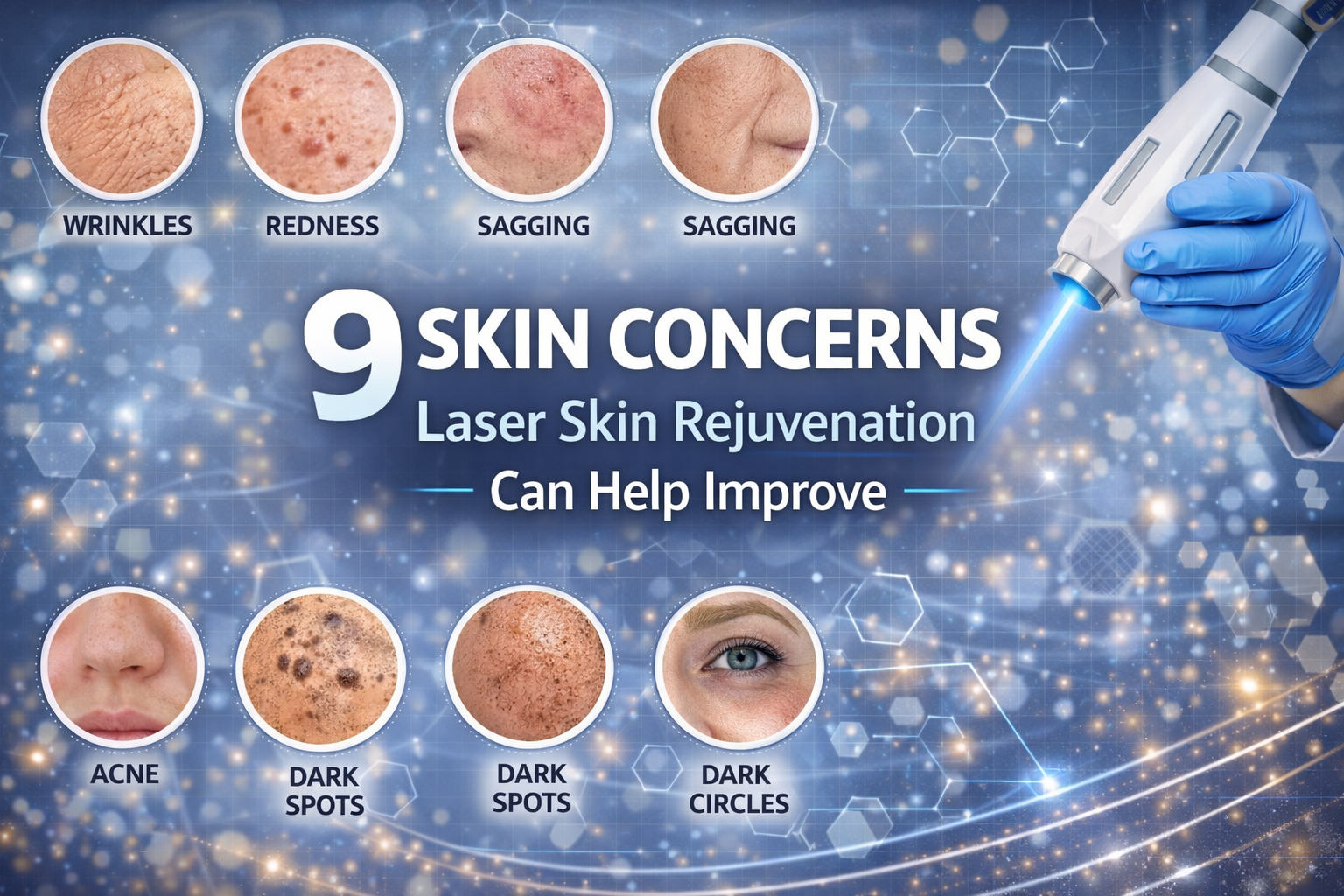
Healthy, glowing skin often reflects confidence, but daily stress, sun exposure, and aging can change how skin looks and feels. Our patients seek gentle, practical solutions that improve texture, tone, and clarity without lengthy downtime. This blog explores common concerns and explains how modern treatments deliver real, visible results. You will learn why our patients value laser skin rejuvenation benefits for smoother skin and a refreshed appearance. Whether early aging or stubborn imperfections concern you, understanding your options helps us tailor laser therapy to suit your needs. 1. Acne Scars Acne scarring often occurs after breakouts, typically affecting men and women between the ages of 12 and 35. Acne begins as lesions on the skin that become inflamed. These blemishes could be caused by hormonal imbalance and, in most cases, affect the face. Many of our patients experience different types of acne with varying degrees of severity due to genetic and immunological factors. Laser treatment for acne scars resurfaces the damaged layers of facial skin. The treatment stimulates new skin growth and reduces scar penetration and discoloration. After a few sessions, the scar will lighten and the skin will even out. Our patients typically notice a difference after three or four appointments, especially when paired with a healthy skincare routine. 2. Visible Blood Vessels and Redness Damaged capillaries or dilated vessels beneath the skin may lead to persistent redness. Facial erythema is a common condition, especially in people with fair skin. Facial erythema is frequently a symptom of bacterial infections or lupus, and we often treat the cause before the cosmetic issues. Laser treatment uses targeted light wavelengths that are absorbed by blood, safely shrinking broken blood vessels. This results in reduced signs of rosacea. Treatment reduces inflammation in veins without the need for chronic medication. Our therapy relieves redness and improves an even complexion with minimal downtime. 3. Rosacea Management Redness and sensitivity commonly affect the cheeks and nose areas. While there is no specific cure, you can learn how to manage your symptoms. Facial laser treatment can diminish problematic blood vessels, stimulate collagen production, and strengthen your skin to counter future flare-ups. Many patients require regular sessions to calm rosacea and reduce its visibility. 4. Laser Treatment for Sun Damage Repair Sun exposure often leads to pigmentation, which results in dark marks and wrinkles. We offer numerous laser techniques to treat sun-damaged skin, depending on the area and skin type. By targeting affected areas, we encourage new skin formation, reduce age spots, and even out your complexion for a more youthful appearance. In addition to laser treatment for uneven skin tone, we encourage consistent use of sun protection post-treatment to enhance results. 5. Collagen Stimulation from Age-Related Concerns Collagen production naturally slows with age, often leading to sagging skin and fine lines. Laser treatment for wrinkles and fine lines triggers collagen renewal, slowing down your skin’s aging process. Our non-invasive therapy gently lifts the skin, improving texture and increasing elasticity. Over a few treatments, your skin regains a plumper appearance, which is a desirable look in modern beauty standards. 6. Pigmentation Correction Hyperpigmentation from UV damage or genetic conditions often dulls your complexion. Treatment targets melanin buildup to lighten dark spots and achieve a more uniform appearance. Our patients enjoy clearer skin and a more even tone from multiple sessions of laser facial rejuvenation. 7. Pore Size Reduction Enlarged pores often stem from uneven skin texture. Several factors could cause your pores to expand, including aging, genetic predisposition, or prolonged UV exposure. Targeted laser treatment for texture improvement can reduce the size of your pores and control their sebum levels. Tightening pore walls through collagen stimulation can result in smoother skin that resists excessive oil buildup. Refined pores can improve your skin’s appearance by creating a softer surface. 8. Spider Veins Small blood vessels near the skin’s surface can cause unpleasant redness, typically on the cheeks. Laser skin resurfacing breaks down damaged vessels so your body can naturally absorb them. Common positive results include reduced redness and clearer skin. 9. Scar Improvement Acne scars aren’t the only blemishes our clients struggle with. Surgical scarring also responds well to laser treatment. Over time, scars flatten and become less apparent. Not only can we achieve enhanced texture, but we can also improve skin uniformity. Using fractional technology ensures a non-invasive treatment that can reduce and even eradicate scars. We’re Your Next Step Towards Healthier Skin Choosing the proper treatment starts with understanding your skin and trusting the guidance you receive. Our team evaluates your needs and creates a plan that supports long-term skin health. We help you feel confident and informed every step of the process. Whatever your skin concerns, laser treatment improves texture, tone, and clarity. If you want smoother, brighter skin with expert care, we’re ready to guide you towards your goals. Contact us for a professional and tailored consultation where we put your needs first.

Peptides are powerful, naturally occurring ingredients that help revive your skin. Incorporating peptide treatments into your skincare appointments can help you achieve a youthful, healthy glow. Peptides are powerhouse ingredients in skincare, a natural approach to anti-aging, repair, and hydration for suppler, firmer skin. The Top 4 Benefits of Peptides for Skin Rejuvenation Peptides continue to grow in popularity thanks to their powerful skin protection properties. We’ve highlighted the top 4 benefits of peptides for skin health. Collagen stimulation - peptides for collagen stimulation, also known as signal peptides, notify skin cells to increase collagen production. This critical protein provides skin with elasticity and firmness, which are essential for smooth, plump skin. Enhancing the skin barrier – your skin is the first line of defense against the sun, environmental factors, and a lack of hydration. Peptides can reinforce this protective barrier by gathering vital minerals that enhance barrier function, aiding in hydrated, resilient skin. Anti-inflammatory – inflammation can accelerate aging and contribute to numerous skin problems, including acne and rosacea. Some types of peptides can reduce inflammation by restricting the creation of pro-inflammatory molecules. Wound healing – peptides can promote healing and skin regeneration. Copper peptides enhance collagen production, accelerating tissue repair and reducing the recovery period. By boosting skin cell turnover, skin can heal more quickly and may even reduce scarring. Peptides in Anti-Aging Treatments: The Top 4 Benefits The age-defying properties of peptides have numerous benefits in skincare, which explains why they’re so popular. Peptides for fine lines and wrinkles – neurotransmitter inhibitor peptides are key to reducing wrinkles in the skin. Since these peptides block the indicators of muscle movement, your facial muscles relax more. This can lead to smoother skin and fewer fine lines. Improving firmness – signal peptides for skin elasticity help achieve firmer, suppler skin. They support collagen and elastin production by increasing the levels of growth factors that decline with age. The result is plumper, more youthful-looking skin. Brighter skin – Carrier peptides can improve skin radiance by delivering essential trace minerals that are imperative for healthy skin function. Specific peptides can protect against oxidative stress and UV damage, promoting a brighter skin tone. Combating dryness – peptides help the skin stay moist and soft by boosting its water-holding capacity. They help build and support collagen, elastin, and natural water‑holding substances in the skin, which keep it firm and bouncy. Peptides also help the skin retain moisture longer, so it feels hydrated instead of dry. Why Peptides Outperform Mainstream Anti-Aging Methods Peptides transform anti-aging skincare by communicating directly with skin cells to support renewal, strength, and resilience. They work intelligently with natural skin processes, which explains the growing focus on peptide skincare benefits. This approach delivers visible improvements while supporting long-term skin health and confidence. They deliver impressive results while remaining gentle, making them suitable for sensitive, dry, or weakened skin types. They align with the skin’s natural biology, encouraging cellular communication without aggressive exfoliation or irritation. They remain safe for continued use, supporting ongoing regeneration and forming a reliable base for long-term rejuvenation routines. Who Is a Good Candidate for Peptides for Wrinkle Reduction? Peptide skincare suits anyone noticing early or advanced signs of aging, including fine lines, sagging, or dull skin. It also benefits those with sensitive or irritated skin who want a gentle anti-aging solution. People who want to boost collagen and skin firmness, as well as those focused on preventive skincare, can experience visible benefits. Peptides for skin firming support overall structure, hydration, and repair, making them versatile across multiple concerns. Most skin types, including sensitive skin, tolerate peptides well when used correctly. However, pregnant or breastfeeding individuals and those with certain conditions like eczema or psoriasis should consult with us before starting any peptide-based treatments. Small Molecules Create Big Skin Changes Small molecules often drive the most potent skin transformations, and peptides prove this every day in advanced skincare. They communicate with skin cells to support collagen production, elasticity, and cellular repair. This targeted approach helps skin look firmer, smoother, and more resilient over time. Unlike aggressive treatments, peptides respect skin balance while still delivering visible rejuvenation. Anti-aging peptides also support long-term skin health, not just short-term cosmetic improvement. With consistent use, skin gains strength, clarity, and a healthier glow. These benefits make peptides a smart choice for anyone seeking sustainable anti-aging results. If you want personalized guidance and professional-grade treatments, book a consultation with us and let’s start your skin rejuvenation journey together today.
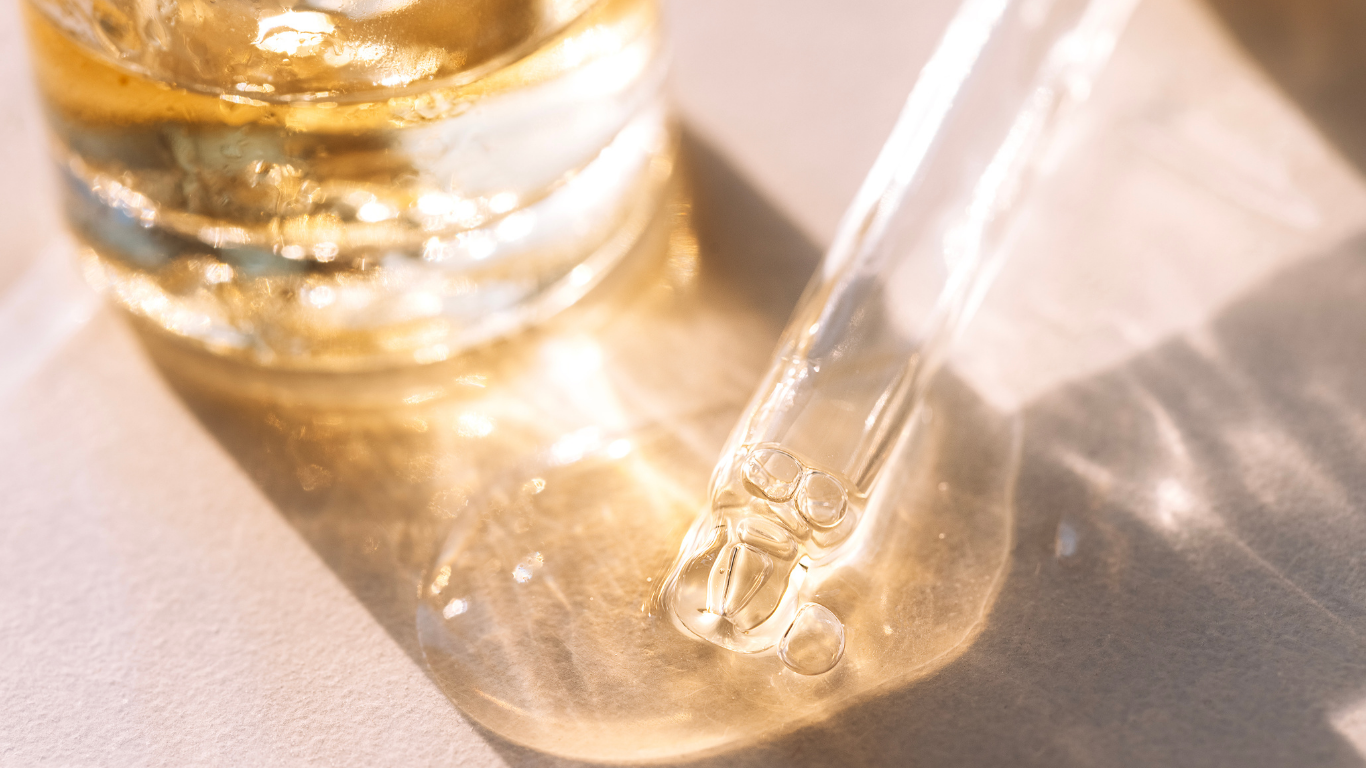
The field of peptides in aesthetic medicine is evolving. Still, we do know that they’re a valuable tool for numerous cosmetic treatments. Peptides are molecules made up of proteins that send positive signals to your body. They’re an essential building block of cells, instrumental in various biological functions. There are four main types of medical-grade peptides, classified by their specific functions. 1. Signal Peptides Signal or bioactive peptides direct proteins to their proper place within the cell. These cosmetic peptides are typically used in skin repair, healing, and regeneration. They trigger the production of collagen and elastin, support healthier skin, and accelerate repair. 2. Carrier Peptides Carrier peptides are amino acids that help deliver other molecules into your skin cells. On their own, they might not do much, but their job is to carry essential ingredients deep into the skin where they can do powerful work. In aesthetic medicine and skincare, carrier peptides are often used to firm the skin, accelerate healing after procedures, and improve overall skin health. 3. Enzyme-Inhibitor Peptides Your skin naturally contains enzymes that break down proteins like collagen and elastin, which help keep your skin firm and smooth. Over time, or due to sun damage, these enzymes can work too hard, leading to wrinkles and sagging. Enzyme-inhibitor peptides slow down or block these enzymes, helping to protect the structure of your skin and keep it looking younger for longer. While carrier peptides deliver helpful ingredients, enzyme-inhibitor peptides are the brakes that stop your skin from aging too fast. 4. Neurotransmitter Peptides Your facial muscles receive signals from nerves that tell them to contract, ultimately causing expression lines and wrinkles over time. Neurotransmitter peptides interfere with these motions, so the muscles don’t contract as much. The result is smoother skin and fewer wrinkles, similar to what Botox does, but in a more natural way. These peptides for anti-aging tell your facial muscles to relax, helping prevent the formation of wrinkles. How are Growth Factor Peptides Used in Aesthetic Treatments? Peptides help revitalize your skin at a cellular level, making it healthier and firmer while providing hydration. They possess the capacity to target a specific action, where each type has its own function. Thanks to their small size, they have an unmatched capability to penetrate the skin. We deliver peptides in several ways to give your skin exactly what it needs. Creams, masks, and serums provide daily nourishment and support, keeping your skin healthy and glowing. Our microneedling treatments help peptides reach deeper layers, boosting collagen and repairing from within. For more targeted effects, precise injections stimulate collagen, relax muscles, and encourage natural healing. Each treatment works with your skin, helping it feel firmer, look smoother, and remain radiant. The Difference Between Injectable and Topical Peptides for Skin Repair Topical peptides, found in serums and creams, nourish the skin’s surface. They gently signal your cells to increase collagen, enhance elasticity, create healthy skin barriers, and reduce inflammation. Over time, this helps your skin look smoother, firmer, and calmer, making it safe and ideal for at-home use. Injectable peptides are delivered underneath the skin and into deeper tissues for more targeted clinical effects. These treatments can support faster healing, tissue regeneration, muscle recovery, youth-enhancing results, and metabolic benefits. Injectable peptides work from within, while topical peptides support your skin from the outside. We often combine topical and injectable peptides for truly comprehensive results. Combining the two allows us to personalize your treatment, giving both visible surface results and deeper, long-lasting benefits. Whether you’re focused on prevention or advanced results, peptide therapy aesthetics can be tailored to meet your skin and body’s unique needs. When Will I See Results From My Peptide Treatment? The time it takes to notice changes from treatment depends on the method and the types of peptides used for skin rejuvenation. Topical peptides generally yield initial improvements in terms of hydration and smoothness, and some patients notice a plumping effect after the first few weeks. After roughly three months of regular treatments, the elasticity and firmness of your skin improve while softening fine lines. Your skin will continue to improve in texture and condition as we advance. Patients typically start seeing results from injectable peptides after three days of treatment. Early results include better sleep, increased energy, and improved skin quality. Book Your Consultation Today Peptides have earned their place in new-age health and skin care, as they communicate with the body at a cellular level, helping our skin function more efficiently. Peptides for collagen production form part of natural regenerative aesthetics treatment , enabling individuals to age gracefully without harsh procedures and recovery time. Our team brings years of aesthetic experience and understanding to every appointment, integrating treatments to suit your body’s unique needs. We understand that skincare is not a one-size-fits-all procedure, and we tailor our approach to deliver youthful results. For more information on aesthetic peptide treatment, contact us today.
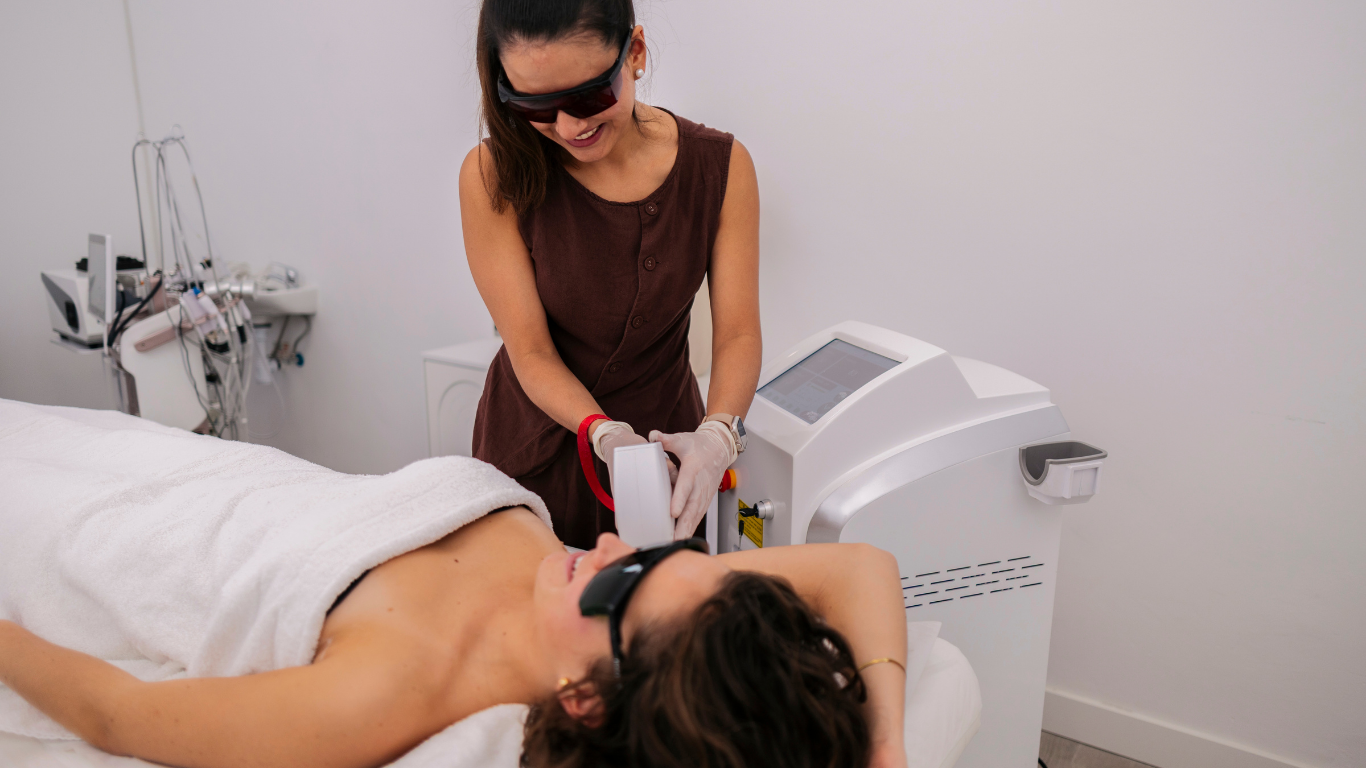
Laser treatment is a popular skin rejuvenation treatment, but timing plays a key role in the overall result. This minimally invasive procedure targets a variety of concerns like fine lines, scarring, and uneven skin tone. While you can have professional laser treatment during any season, you can optimise your laser facial timing to maximize results. The months during fall and winter offer ideal weather conditions for effective healing, with minimal UV exposure and milder temperatures. Key Insights About Seasonal Laser Treatment Side effects from laser treatments are typically mild and short-term; however, sun exposure and heat may enhance these reactions. Exposing your skin to the sun before or after your treatment increases the possibility of developing hyperpigmentation, which is usually permanent. Winter is the preferred season for laser resurfacing, too, as the newly exfoliated skin is sensitive to the sun and harsh temperatures. Laser skin treatments build on your skin’s natural sensitivity by temporarily making the treated area more reactive. Prolonged exposure can cause the issues that the treatment is fighting, including freckling and aging. We recommend you protect your skin from the sun for 6 weeks before any laser treatment. Avoid spending time outside, apply sunscreen twice a day, and wear sun-protective clothing. These measures are difficult during the summer season, which makes the cooler months easier to minimize risk. Understanding Laser Treatment and Sun Sensitivity Laser resurfacing removes damaged skin and boosts collagen to enhance texture, tone, and overall appearance. Whether you choose fractional, ablative, or non-ablative treatments, your skin will temporarily become more sensitive to sunlight. This increased photosensitivity happens because laser procedures create controlled micro-injuries that trigger healing and regeneration. During recovery, your skin loses some of its natural defenses and reacts more easily to UV exposure. Proper timing of laser skin treatments and sun protection ensures the best results while keeping your skin safe. How Laser Treatments Affect Skin Sensitivity Immediate post-treatment sensitivity: laser resurfacing temporarily removes or disrupts the skin’s protective outer layer. As new skin forms, the treated area becomes especially vulnerable to sun damage. Extended sensitivity periods: · Ablative lasers - skin can remain sensitive for 3–6 months or longer. · Fractional lasers - increased sensitivity usually lasts 4–8 weeks. · Non-ablative lasers - photosensitivity typically continues for 2–4 weeks. · Multiple treatment sessions - sensitivity can accumulate throughout the entire course. Understanding these timelines helps you plan sun protection and recovery strategies to maintain healthy, radiant results. How Cool Weather Supports Recovery Recovering from laser resurfacing can be more comfortable during fall and winter. Beyond reduced sun exposure, cooler temperatures, lower humidity, and seasonal lifestyle changes also support faster, smoother healing. Temperature and Humidity Advantages Reduced inflammation – cooler air naturally calms swelling and discomfort that often follow laser treatments. It feels soothing on sensitive skin, unlike hot summer conditions, which can increase irritation. Lower humidity prevents complications – less sweat helps prevent irritation and reduces infection risk. Drier air also limits bacterial growth and keeps the skin feeling comfortable. Improved product effectiveness – skincare serums and healing ointments absorb better in controlled humidity, supporting your skin’s recovery. Natural cooling effects – winter air gently cools treated areas, minimizing heat and inflammation after procedures. This natural environment reduces reliance on extra cooling measures and encourages the skin’s own healing process. Choosing the best time for laser treatments in cooler months helps take advantage of these environmental benefits, promoting healthier, more comfortable recovery. Lifestyle Factors Supporting Laser Treatment Success Indoor focus during recovery - fall and winter naturally encourage staying indoors, which suits post-laser care. Limiting outdoor activities reduces sun exposure, allows for proper rest, and gives more time for consistent skincare routines. Protective clothing advantages – layered winter clothing naturally shields treated areas, providing gentle protection while you heal. These simple lifestyle adjustments support your skin’s healing and enhance long-term treatment results. Schedule Your Laser Skin Rejuvenation Treatment at The Studio Med Spa Cooler months represent the perfect opportunity to invest in A-grade quality treatments with us. Understanding the importance of when to get a laser facial helps make sure that your procedure provides maximum benefits with nominal risks. The months you spend nurturing your skin translate into decades of healthy appearance. We aim to help individuals achieve skin transformation through skillfully timed and executed laser facials. Our approach blends advanced technology with curated planning that takes your lifestyle and aesthetic goals into mind. Prepare your skin for the coming year with our laser rejuvenation tips and reap the benefits with The Studio Med Spa.
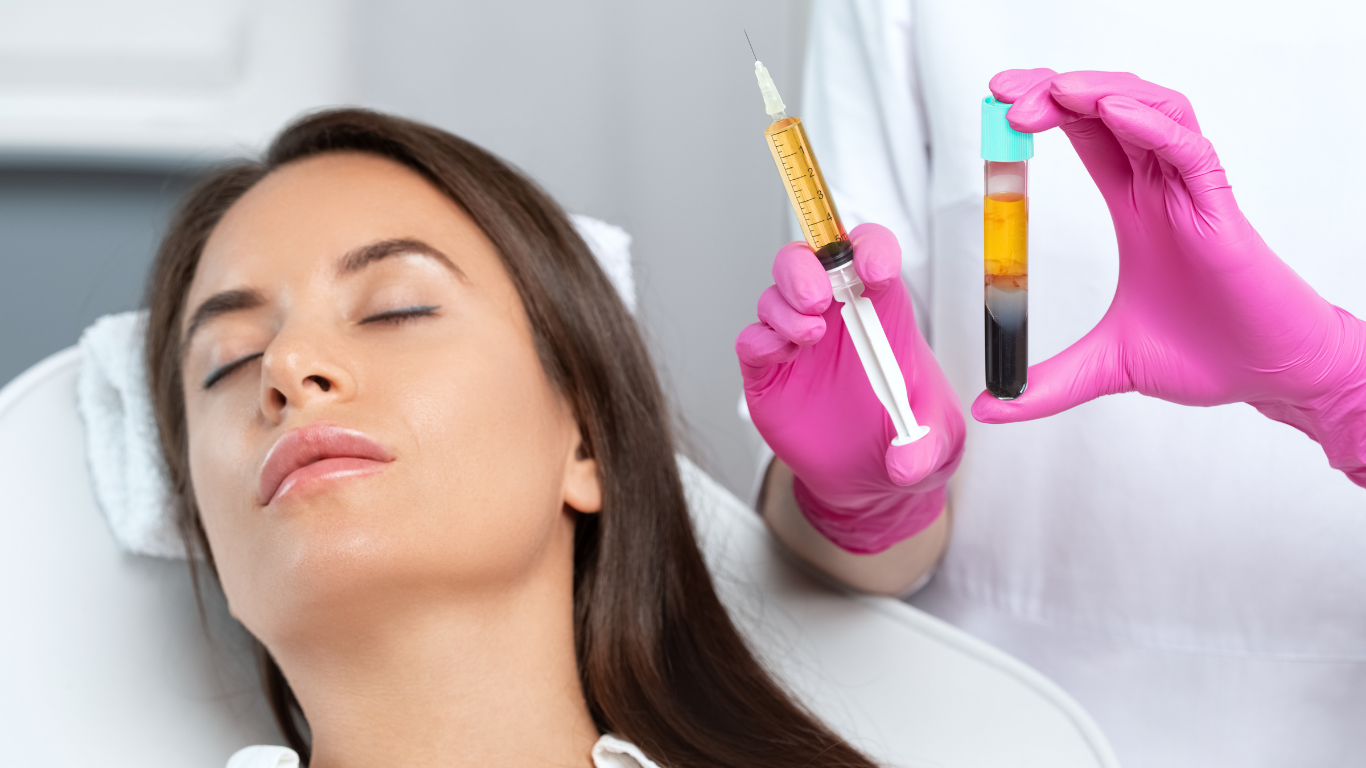
The area surrounding the eyes is the first to show signs of aging due to multiple factors. This delicate skin lacks protective subcutaneous fat and has fewer oil glands, making it prone to dryness and collagen loss. The eye area endures constant muscle movement from blinking and squinting. It is also a prominent area that shows sleep deprivation, wrinkles, puffiness, and sagging skin. Platelet Rich Plasma (PRP) and Platelet-Rich Fibrin (PRF) have become increasingly popular for treating the skin under your eyes as they focus on harnessing your body’s natural healing abilities. These treatments stand out for rejuvenating the skin without the need for invasive surgeries and downtime. By utilizing naturally produced platelets, PRF and PRP under eye treatment therapies enhance natural restoration, leading to visible improvements in your appearance. A Natural Approach to Anti-Aging Therapy PRP and PRF treatments work with the body’s organic healing and regenerative abilities. This approach uses your own platelets to support healthier, refreshed skin. Think of it as encouraging your skin to do what it already knows to do. Platelets play a far bigger role than helping blood clot. They carry powerful growth factors that guide the healing process. These growth factors attract repair cells and support collagen production. Collagen keeps skin firm, smooth, and resilient. As collagen levels decline with age, wrinkles, laxity, and loss of volume become more noticeable. When PRP or PRF enters the skin, it directs the body’s repair response to that area. Platelets release growth factors that encourage cell renewal and tissue repair. They also stimulate fresh collagen formation. This process improves skin quality from within, leading to smoother texture, better tone, and a naturally refreshed appearance through natural under-eye treatments. PRP and PRF as Under-Eye Treatments PRF has gained considerable interest for under-eye concerns due to its advanced regenerative benefits. Compared to PRP, PRF delivers a higher platelet concentration within a supportive fibrin structure. This structure releases growth factors gradually, allowing results to develop over time. The fibrin framework supports new cell growth while strengthening collagen and elastin layers. Skin under the eyes appears smoother, fuller, and more flexible. During a PRF treatment, we collect and process a small blood sample to yield a concentrate platelet-rich fibrin. We then place precise injections beneath the eyes to improve skin texture and elasticity. This approach helps address tear troughs, fine lines, hollowness, and discoloration. Many clients explore dark circles treatment through PRP and PRF for under-eye hollows to achieve a brighter, well-rested look. You may experience mild swelling, redness, or bruising after treatment, which usually fades within a few days. Expect visible results within weeks that typically last six to twelve months. Many patients choose a series of three to five sessions for optimal improvement, depending on goals and individual needs. What Are the Key Differences Between PRP and PRF as Under-Eye Treatments? PRP and PRF both harness your body’s own platelets to refresh and restore delicate under-eye skin, but their method differs slightly. PRP contains a high concentration of platelets in plasma, delivering a quick burst of growth factors to stimulate collagen and improve skin texture. PRF, on the other hand, includes a fibrin matrix that allows platelets to release healing proteins gradually over time. This prolonged activity supports deeper tissue repair, encourages new cell growth, and enhances skin elasticity. Understanding the PRP vs PRF under - eye processes helps you choose the proper treatment for your goals. Both options brighten, smooth, and naturally rejuvenate tired-looking eyes, leaving the area refreshed and youthful. How Often Should I Get PRP Treatments? We typically advise between two and four initial treatments with five-week intervals between each appointment. This method boosts collagen production and encourages steady collagen renewal. Following these treatments, we recommend one or two yearly maintenance sessions to sustain your results. Combined with microneedling or PRF, eye rejuvenation maximizes your results for enhanced skin renewal. Trust Studio Med Spa for Professional Facial Therapies For years, our clients have trusted us to provide high-grade treatments for the face and body. Our goal is to highlight your natural beauty through state-of-the-art, innovative procedures available at three convenient locations. We offer free initial consultations to prepare individualized treatments that align with your desired results. Our payment plan makes it even easier to access the treatments to enhance your confidence. Whether it’s through laser therapy, weight loss shots, or HRT treatment, we offer a comprehensive range of medical and aesthetic solutions to suit your requirements. Contact us today to start your journey with us.
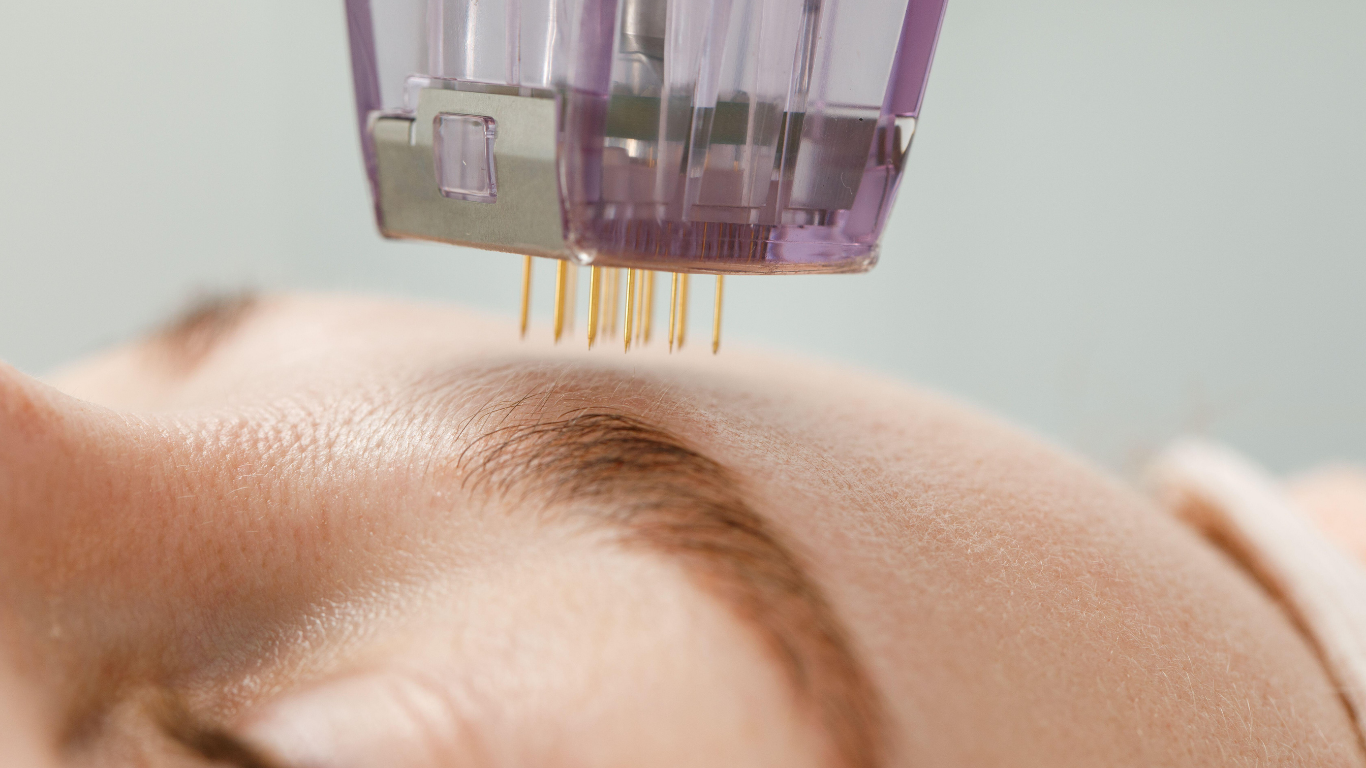
When it comes to skin rejuvenation, there are numerous products and treatments offering hydration, fine line reduction, and collagen stimulation. While products may improve skin’s superficial tone and texture, advanced treatments harness regenerative power from within to combat the effects of aging and unhealthy lifestyle factors. Microneedling, platelet-rich plasma PRP, and PRF platelet-rich fibrin facial therapies, used as individual or combination treatments, offer natural skin renewal, each providing unique and targeted benefits. What Is Microneedling? Percutaneous collagen induction therapy, more commonly known as microneedling, is a treatment involving a device that creates tiny punctures to the skin. Micro-needles create minute injuries that trigger a process known as dermal remodeling. This process causes the body to increase collagen and elastin production while releasing new cells to regenerate tissue. Fine lines, enlarged pores, and acne scars benefit from this treatment. What Is PRP? A Platelet-Rich Plasma (PRP) facial, commonly known as the “vampire facial”, uses a concentration of the patient’s own platelets, derived from their blood. The process involves drawing blood, processing it to isolate the platelets, and injecting them into a targeted area. PRP is commonly used for orthopedic injuries like torn ligaments, tendons, and osteoarthritis as it delivers high levels of healing proteins to the area. The process accelerates healing and repair and reduces inflammation. Cosmetically, PRP promotes new cell growth to rejuvenate skin and hair. Patients notice plumper, smoother skin, a reduction in fine lines, and enhanced skin elasticity. What Is PRF? PRF, or Platelet-Rich Fibrin, is derived from a small sample of your own blood, making it a natural regenerative treatment. Once processed, it forms a fibrin matrix rich in growth factors that stimulate collagen production and skin renewal. This controlled, gradual release enhances tissue repair and rejuvenation, improving skin texture, tone, and elasticity. PRF works with your body’s own healing processes, providing a safe and effective way to restore a youthful, healthy glow while supporting long-lasting, natural-looking results. What Happens If I Combine Treatments? While microneedling on its own is a powerful treatment, pairing it with PRP or PRF can enhance your overall results. Combining procedures elevates skin rejuvenation by working with your body’s own repair systems. Microneedling creates controlled microchannels that stimulate collagen and improve overall skin texture. When we add PRP or PRF, those channels deliver concentrated growth factors directly where the skin needs support. PRP contains platelets that release signals encouraging faster repair and brighter skin tone. PRF takes this benefit further with a slower release of nutrients for longer-lasting stimulation. This synergy enhances firmness, smoothness, and glow more effectively than microneedling alone. Our clients often notice improved elasticity, refined pores, and healthier color within weeks. Fine lines soften as collagen production increases steadily over time. Skin also recovers faster, with reduced redness compared to microneedling on its own. Many clients ask about PRF vs PRP for face treatments, especially when seeking natural skin renewal. Both options use your own blood components, which lowers allergy risk and supports biocompatible healing. This combination suits individuals who want visible results without harsh chemicals or aggressive procedures. It offers a personalized approach that respects skin biology while delivering noticeable rejuvenation. What You Should Know About Our Treatments What does PRP add to microneedling? PRP enhances healing and boosts radiance by delivering growth factors directly into the skin. Many individuals notice quick, visible improvements. What does PRF add to microneedling? PRF provides extended stimulation due to its gradual growth factor release. This often leads to improved firmness and longer-lasting results. Which treatment delivers the most natural results? All three treatments rely on your body’s own regenerative abilities. This creates subtle, natural-looking improvement rather than dramatic changes. Is PRF stronger than PRP? PRF offers a more sustained effect rather than stronger intensity. Its slower release supports longer-term collagen renewal. Can microneedling work without PRP or PRF? Yes, microneedling for collagen production alone delivers noticeable skin improvement. Adding PRP or PRF often enhances results and accelerates recovery. Which option works best for fine lines and wrinkles? Microneedling combined with PRF often delivers stronger collagen support. This makes it ideal for fine lines and early ageing. How do I choose between microneedling, PRP, and PRF? Your skin goals, timeline, and budget help guide the best choice. A professional consultation ensures a personalized plan. Find the Right Treatment for Your Skin Choosing the ideal treatment depends on your skin goals, lifestyle, and expected pace of results. Microneedling suits clients who want improved texture, smoother tone, and steady collagen support. PRP works well for those seeking a faster glow and enhanced recovery after treatment. PRF appeals to clients focused on deeper regeneration and longer-term collagen stimulation. Understanding PRP vs PRF helps clarify which option aligns with your expectations and timeline. All three skin rejuvenation treatments support natural renewal without harsh chemicals or fillers. A consultation with us brings clarity and a personalized plan that respects your skin’s unique needs. Contact us and start enjoying PRP, PRF, and microneedling benefits today.

What Makes GLP-1 and GLP-2 Different? A Simple Guide for Patients Considering Injectable Weight Loss
With numerous weight loss injections available, choosing the best option can become tricky. Understanding the roles of GLP-1 and GLP-2 hormones as weight loss treatments can help make your choice easier. While their respective functions differ, their correlation enhances the effects of each treatment. Introduction to How GLP-1 Works GLP-1 (Glucagon-Like Peptide-1) acts as your body’s ‘’fullness’’ messenger. It signals to your brain when you’ve had enough to eat, reducing over-indulgence. This hormone also helps control blood sugar by helping your pancreas release the correct amount of insulin. The GLP-1 can also slow digestion, keeping you satisfied for longer. Introduction to How GLP-2 Works GLP-2 (Glucagon-Like Peptide-2) works to keep your intestines healthy, constantly repairing and maintaining the gut lining. Healthy GLP-2 levels enhance nutrient absorption, ensuring your body gets the most from the food you eat. GLP-1 and GLP-2 complement each other. GLP-1 helps you feel satiated, while GLP-2 keeps your gut healthy, supporting better weight loss results. Which GLP Treatment Should I Use For Weight Loss? The difference between GLP-1 and GLP-2 matters here; GLP-1 is usually the first choice when weight loss is your primary goal. It reduces appetite, limits overeating, and supports smaller portions and fewer cravings. It enables steady, sustainable progress without extreme dieting. GLP-2 is more relevant when gut health needs targeted support, particularly in cases of poor nutrient absorption or ongoing digestive problems. It does not directly promote weight loss, but it helps maintain a healthier gut, which can support long-term well-being. The key distinction is that GLP-1 focuses on helping you lose weight, while GLP-2 focuses on how well your body processes what you eat. GLP-1 injections aid weight loss because you feel satisfied with less food and are less likely to snack compulsively. GLP-1s also slow gastric emptying, meaning food stays in your stomach for longer, which prolongs satiety and makes it easier to follow a balanced eating pattern without resorting to crash diets. Common FAQs on GLP-1 Injections for Weight Loss How soon will I start seeing results? Many individuals feel a difference in their appetite in the first two to four weeks. The numbers on the scale may move slowly initially, but weight loss builds steadily over time. Our patients appreciate the gradual progress as it’s sustainable and realistic. Do I need to follow a diet while on GLP-1 medication? Healthy eating will always be important, regardless of where you are in your weight loss journey. Although GLP-1 helps you feel satisfied after eating less, nutritious meals mean more energy and better long-term results. Balanced meals, less processed sugar and carbs, and mindful eating habits ensure effective treatment that is easier to maintain. Should I exercise while on weight loss injections? GLP-1 treatment pairs well with a regular exercise routine. Walking and strength training accelerate fat loss and can boost metabolism. Moderate activity can improve sleep and mood, which form part of a successful weight loss journey. Can I have the GLP shots if I don’t have diabetes? Before we prescribe a GLP-based weight-loss treatment, we conduct tests to determine the safest weight-loss solution for your body. Our GLP-based injectable weight loss treatments have been, and continue to be, a preferred choice among our clients without diabetes. Will I regain the weight if I stop the injections? GLP creates a starting point for change, but long-lasting success depends on maintaining a healthy lifestyle during and after treatment. A nutrient-rich diet, regular exercise, adequate hydration, enough sleep, and managing stress levels all contribute to positive long-term results. Who Is An Ideal Candidate for GLP-1 Treatment? A good candidate for GLP-1 weight loss injections is someone who struggles with appetite control or frequent cravings. You may also benefit if portion sizes feel difficult to manage, even with healthy intentions. These injections suit adults seeking steady weight loss rather than fast and temporary results. They work well for people with a BMI in the overweight or obese range, especially when lifestyle changes need extra support. With the proper guidance, GLP-1 can unlock progress that finally feels achievable. Do I Need GLP-2 For Weight Loss? GLP-2 weight loss therapy alone does not directly reduce appetite, so candidates should combine it with healthy eating and lifestyle strategies. People who want to strengthen their digestive system while supporting long-term wellness may find GLP-2 helpful. Paired with our experienced guidance, this treatment can complement numerous approaches and make weight loss more manageable and sustainable. GLP Therapies That Support Your Goals Choosing the right therapy starts with understanding the differences in how each works. Learning about GLP-1 vs GLP-2 helps you see which approach suits your weight loss goals. While GLP-1 supports appetite control and steady fat loss, GLP-2 strengthens your gut and improves nutrient absorption. Both have roles in overall wellness, but your needs determine the best option. Chat to us so we can create a plan tailored to your lifestyle, habits, and goals. With the proper guidance, our GLP therapies can make healthy, lasting weight loss feel achievable and realistic.

Hormones act as the body’s internal messengers and guide key functions like energy, mood, sleep, and metabolism. When these messengers become imbalanced, your body sends signals that require attention. Hormonal shifts affect men and women differently, but many signs overlap. Below, we will discuss the common hormone imbalance symptoms, as well as the gender specific indicators, so you can understand what your body may be trying to tell you. Common Symptoms of Unbalanced Hormones Hormone imbalance often shows up through signals that both men and women recognize. We explore the shared signs and help you understand how these changes may reflect shifts in your overall health. Unexplained weight changes – sudden weight gain or reduction without dieting or exercising can signal thyroid issues, insulin resistance, or sex hormone instabilities. Fatigue – if you’re constantly exhausted, even after a restful sleep, it could be due to thyroid issues, low testosterone levels, or adrenal problems. Medical testing can assist in identifying if there’s a link between your fatigue and hormones. Mood swings – progesterone, testosterone, or estrogen imbalance may influence brain chemistry, causing irritability. Cortisol imbalance can also activate anxiety-related symptoms. Sleep disturbances – difficulty sleeping may be associated with melatonin or other fluctuations. These disruptions may result in persistent drowsiness throughout the day. Hot flushes and night sweats – these symptoms are classic signs of menopause, although they can also be caused by other hormonal disorders in men, too. Hair loss - Hair thinning often starts when hormone levels decrease. High androgens like DHT, low estrogen or progesterone, or an off-balance thyroid can all affect your hair. Stress raises cortisol, which can increase shedding and weaken follicles. Skin changes – persistent acne may be related to low testosterone , dehyroepiandrosterone (adrenal hormone) or thyroid imbalances. Digestive problems - Hormones such as estrogen, progesterone, and cortisol influence digestion for men and women. Shifts in these hormones, especially in women, can trigger digestive issues like bloating, constipation, and irritable bowel syndrome (IBS). Female-Specific Hormone Imbalance Symptoms Women experience unique shifts that can affect cycles and mood changes due to hormones. This section focuses on the symptoms linked specifically to female hormone health . Irregular Menstrual Cycles Many women experience their monthly cycle like clockwork. Others experience irregular patterns. While delayed or missed periods can occasionally occur, it shouldn’t happen regularly, especially with significant gaps between each cycle. It’s common for women between 40 and 50 entering menopause to experience these symptoms, and they may seek menopause treatment to reduce their discomfort. For younger women, this may be a sign of PCOS and warrants an appointment with the doctor for further assessment. Vaginal Dryness While occasional dryness is generally considered normal, low estrogen levels could be the cause of this symptom. This hormonal imbalance can reduce moisture around your vagina, leading to constant discomfort and possible rashes. Infertility Hormones guide every stage of female reproduction, especially those controlling the menstrual cycle. They signal egg growth in the ovary, trigger its release into the fallopian tube, and prepare the uterine lining for implantation. One or more missing or imbalanced hormones can disrupt these steps, making conception more difficult. Signs of Hormonal Imbalance in Men Male hormones influence, among others, muscle mass, sexual health, and overall well-being. This section highlights the signs that may indicate a hormonal imbalance in men, and when testosterone therapy may be necessary. Erectile Dysfunction Hormonal balance is essential for healthy sexual function in men. Testosterone drives libido, sperm production, and overall performance. Low testosterone can cause erectile difficulties, while other hormones like prolactin and thyroid hormones also influence sexual health when they are not balanced. Loss of Muscle Mass Loss of muscle mass can signal a hormonal imbalance in men, especially when testosterone levels drop. Testosterone supports muscle growth, strength, and recovery after exercise. When this hormone decreases, men may notice weaker muscles, slower gains despite training, or increased body fat replacing lean tissue. Other hormones, including growth hormone and thyroid hormones, also influence muscle health. Paying attention to these changes can help men address underlying imbalances early and maintain strength, energy, and overall physical vitality. Mental Health Effects Linked to Hormonal Changes Hormones influence not only physical health but also mood, focus, and emotional well-being. When levels change, men and women may notice anxiety or depression. Brain fog and difficulty concentrating may also appear, making even the simplest tasks feel challenging. Recognizing these changes as potential signs of low hormones can help you take action early. Key hormones like estrogen, progesterone, testosterone, thyroid hormones, and cortisol all impact how the brain regulates emotions and stress. Even slight imbalances can disrupt mental clarity and emotional stability. Restoring hormonal balance often improves mood and sharpens focus, helping you feel more emotionally grounded, motivated, and clear-headed in your everyday life. HRT for Men and Women Hormone replacement therapy helps men and women restore balance when natural hormone levels decline. For women, HRT often targets estrogen and progesterone to ease menopause symptoms, while men may use testosterone therapy to address low energy, low libido, or muscle loss. We tailor treatment to individual needs, carefully monitoring doses and responses. Beyond relieving physical symptoms, HRT can improve mood, focus, sleep, and overall well-being. When managed correctly, it supports a healthier life for males and females. Many of our patients choose bioidentical hormone therapy, which uses hormones identical to those produced by the body, offering a natural approach to treatment. Contact us for a tailored plan to balance your hormones and support your health.

Like many medical treatments, the days or weeks leading up to your initial hormone replacement therapy consultation can feel slightly intimidating. These feelings can stem from the unknowns or uncertainty about the process or the importance of the transition itself. Many patients experience a combination of nerves and excitement before an HRT evaluation. We’re here to let you know that these feelings are valid and completely normal. To prepare you for your appointment, we’ll explore what to expect during your first session and how to maximize your treatment process. A Brief Breakdown of Hormone Replacement Therapy HRT involves replenishing declining hormones in your body. The treatment is primarily used to manage the symptoms of menopause in women aged between 45 and 55, although it may happen earlier. By replacing estrogen and progesterone levels, HRT helps in treating common menopausal symptoms. These symptoms include hot flushes, night sweats, mood swings and anxiety, as well as vaginal dryness. While HRT is commonly used to treat menopause and its associated discomforts, it also has other applications. HRT can help protect against osteoporosis and bone fractures in later life, especially when started before the age of 45. Specific cancers and conditions, such as Lynch syndrome or gene mutations, have previously been treated with HRT. Starting the hormone therapy process within 10 years of menopause may help lower the risk of cardiovascular disease. HRT is commonly used on females who have undergone a hysterectomy, which often causes the onset of menopausal side effects. Preparing for Your First HRT Visit Before starting treatment, we need to understand your body’s unique rhythm. This first step is a deeply personal experience that feels more like a wellness discovery than a doctor’s visit. It all starts with a conversation. Expect an open, friendly, and honest dialogue – we want to hear all about it. We can serve you better if we know when your symptoms first appeared, how they impact your daily living, and where you’d like to see improvement. Whether you’re struggling with mental clarity that steals your productivity or night sweats that disrupt sleep, this is your opportunity to speak openly. Many of our patients leave our practice feeling validated for the first time in years. Next comes a review of your medical history. We’ll ask about surgeries, menstruation patterns, thyroid problems, or family history conditions affecting hormones. It’s also important to be honest about your lifestyle habits, like exercise routines, alcohol consumption, and stress levels. Remember to be truthful about any medications or supplements you may be taking, as they could affect treatment outcomes. To design the most effective treatment proposal, we’ll request bloodwork during your appointment. Hormone imbalance testing screens for hormone levels, as well as thyroid function, blood sugar, cholesterol levels, enzymes, and nutrient levels. We may conduct additional urine or saliva tests, depending on the treatment you require. The more we know about how your body functions internally, the better we can tailor your HRT process. Once we’ve reviewed your lab results and medical history, we can create your custom-made plan. Instead of prescribing a one-size-fits-all approach, our findings allow us to personalize your treatment. Our transparent communication and education ensure you’ll understand each step of your journey. We believe in a collaborative approach to ensure we meet your preferences as well as your end goals. Tips to Prepare You for Your First HRT Appointment Starting HRT can feel overwhelming, especially if it’s your first time. Understanding what happens during an HRT appointment can help ease anxiety and help you prepare for the start of your treatment. Researching HRT and understanding the basics enables you to have a more informed and enjoyable appointment with us. Keeping a log of your symptoms can help us better understand your bodily functions for a more personal treatment plan. Keep a list of all your prescriptions, including over-the-counter medications, to avoid forgetting any of them. Also, note any allergies or reactions you may have to these. Be prepared to discuss your goals with us. This helps us further tailor your plan to maximize the results. Preparing a list of questions before your appointment ensures you leave feeling informed and confident about your next steps at our hormone therapy clinic. Consider bringing someone with you to your appointment. A friend not only provides support but can also help remember essential details about your HRT consultation. Remember to take some time after your appointment to process and absorb all the information shared between us. Plan your next steps and allow yourself to prepare for your treatment. Start Your HRT Journey With a Trusted Partner Starting hormone therapy is a personal journey, and having the proper support makes all the difference. At The Studio Med Spa, our team takes time to understand your goals and guide you every step of the way. If you’ve been scouring the internet for an “experienced HRT doctor near me”, we’re here to help you feel confident, informed, and cared for. Our tailored approach to HRT for women focuses on restoring balance, improving well-being, and helping you feel like yourself again. Book your appointment with us today and regain your life with bioidentical hormones and The Studio Med Spa.
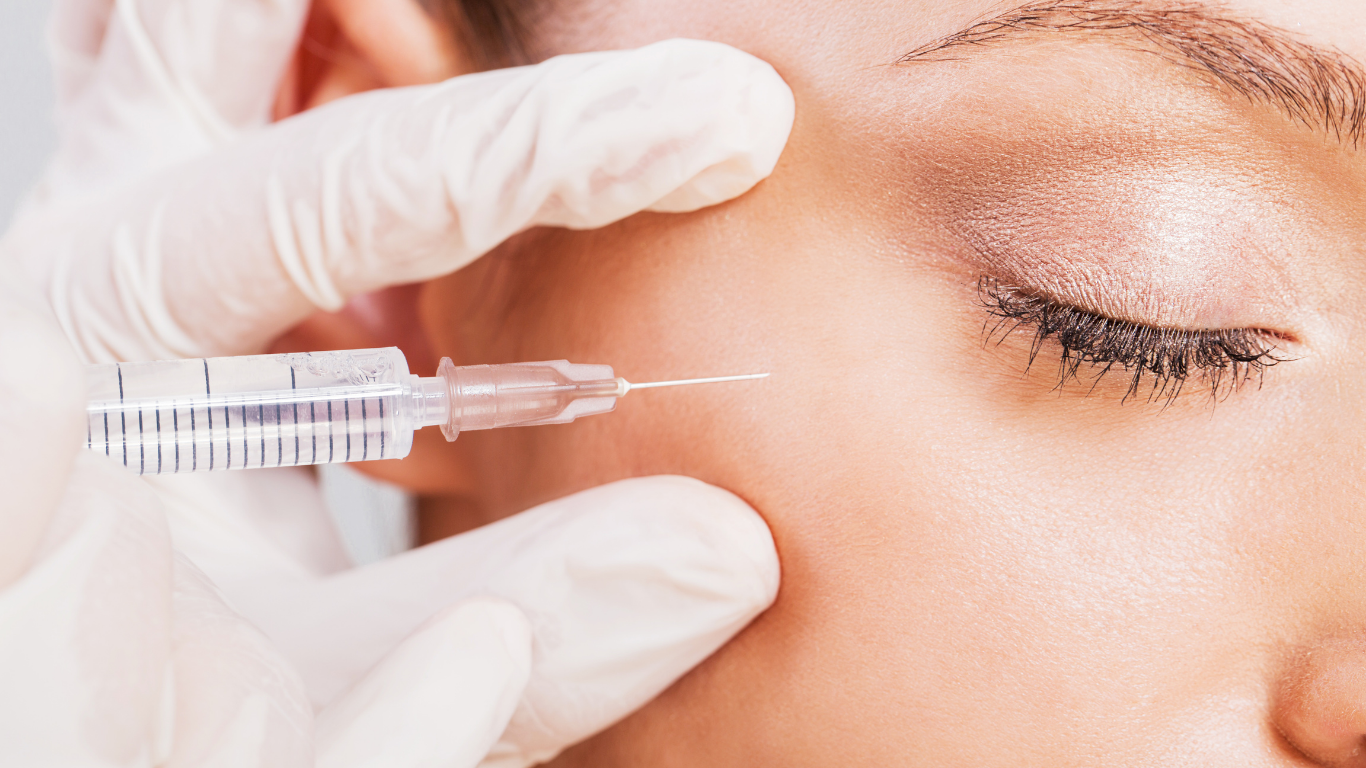
In today’s lifestyle, looking and feeling good often go hand in hand. Dermal fillers are quickly becoming one of the most popular non-surgical treatments for those seeking a rejuvenated appearance. Whether you’re looking to reduce fine lines, restore lost volume, or enhance facial contouring, fillers can provide a self-confidence boost in minutes. Fillers are gel-like substances injected beneath the dermis to enhance your natural beauty. Our fillers, containing hyaluronic acid, help to maintain elasticity while hydrating your skin. Treatment is relatively quick, minimally invasive, and requires no downtime after the appointment. The Psychological Benefits of Injectables Looking your best lifts your mood. This sentiment proves true when we perceive ourselves as youthful and attractive. This positive self-view activates mirror neurons, which affect how we feel. When others compliment our appearance, these neurons respond in both people. This shared reaction builds a natural social connection. Treatments like injectables for confidence can amplify this effect by helping you feel and look your best, both internally and externally. Cosmetic fillers help your appearance match your self-worth. This boost lifts your mood and can ease feelings of depression and anxiety. While injectables improve our physical appearance, they can also increase confidence and emotional resilience. Our treatments can minimize signs of aging and stress that often appear prematurely for individuals who’ve struggled with mental health issues. These procedures allow you to manage your appearance, leading to improved mental health conditions and a more positive self-image. The advantages of Botox and fillers extend far beyond aesthetics. Through the interaction of mirror neurons and progressive self-perception, our treatments can significantly contribute to mood development. The Physical Benefits of Injectables Small, targeted enhancements using fillers can make a meaningful difference. Injectables help align how you look with how you feel, day to day. Opting for filler treatments is a relatively painless procedure. To ensure your comfort during your appointment, we’ll apply an effective numbing cream to reduce any irritation. Non-surgical facial rejuvenation offers minimal downtime, so you can get back to your schedule right after your session. As they work to smooth fine lines and maximize wrinkle reduction, injectables allow for a more effective skincare routine. Your products will apply more evenly, further enhancing their impact. Our treatments are a cost-effective option for minor signs of aging. Compared to surgical procedures, fillers can achieve similar results at a fraction of the price. Since injectables are a low-risk treatment, there’s a reduced chance of side effects from the procedure. Med Spa Treatments to Accompany Injectables and Maximize Confidence We believe that a multifaceted skincare treatment approach often achieves more desirable results. At The Studio Med Spa, we offer a comprehensive range of facial procedures that harmonize for a refreshed appearance. Laser Facial Rejuvenation Concentrated light rays stimulate collagen production and remove damaged skin cells. The result is improved skin tone, texture, and clarity. Laser Scar Revision Multiple laser types remodel collagen, reduce redness, and break down scar tissue. We treat various scar types, including acne marks, surgical scars, and stretch marks. Intense Pulsed Light Therapy IPL uses broad-spectrum light pulses to improve the appearance of skin by targeting the skin’s melanin and hemoglobin. Various conditions benefit significantly from this treatment, including freckles, sun damage, age spots, and redness. Microneedling Fine needles create tiny punctures in the skin, triggering the body’s natural healing process. This minimally invasive procedure treats fine lines, wrinkles, stretch marks, and uneven skin tone. Controlled injuries help regenerate the area, resulting in firmer, evenly toned skin. Chemical Peels Our advanced chemical solution removes outer layers of the skin, revealing fresh, new skin. The shedding of the old cells improves the appearance of fine lines, scarring, and rosacea. Medical Grade Skincare We stock a wide range of well-known skincare brands with active ingredients to protect and improve your appearance. Browse our range of Plated and Alastin products online. No single treatment addresses every skincare concern; however, multiple procedures allow us to build a plan according to your requirements. Many clients visit us with several skin concerns, including pigmentation and fine lines. By combining treatments, we can address multiple issues simultaneously, including reduced elasticity. Targeting multiple problems can boost confidence, as each treatment’s results increase when harmonized. Minor Enhancements, Major Boosts At The Studio Med Spa, we help clients feel confident with expert treatments tailored to specific needs. Our anti-aging injectables enhance natural features while reducing stress and signs of aging. We focus on precise, personalized care to deliver noticeable Botox and filler results that look fresh and natural. Every procedure aims to boost self-assurance and support your well-being. Choose The Studio Med Spa for a friendly, professional experience where subtle, practical enhancements help you look and feel your absolute best.

